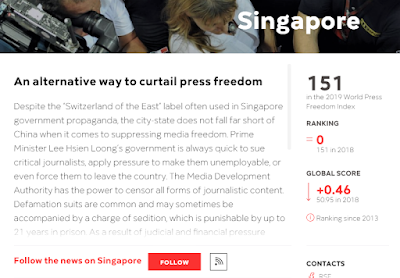An alternative way to curtail press freedom
Despite the “Switzerland of the East” label often used in Singapore government propaganda, the city-state does not fall far short of China when it comes to suppressing media freedom. Prime Minister Lee Hsien Loong’s government is always quick to sue critical journalists, apply pressure to make them unemployable, or even force them to leave the country. The Media Development Authority has the power to censor all forms of journalistic content. Defamation suits are common and may sometimes be accompanied by a charge of sedition, which is punishable by up to 21 years in prison. As a result of judicial and financial pressure from the authorities, self-censorship is widespread, including within the alternative independent media. The red lines imposed by the authorities, known by journalists as “OB markers” (for out-of-bounds markers), apply to an ever-wider range of issues and public figures. The situation worsened significantly in 2018, with serious charges being pressed against five independent news websites and at least seven journalists and bloggers. The Singaporean authorities have also started sending journalists emails threatening them with up to 20 years in prison if they don’t remove offensive articles and play by the rules.
read more
"Prime Minister Lee Hsien Loong’s government responds vigorously to criticism from journalists and does not hesitate to sue its detractors and apply pressure to make them unemployable, or even force them to leave the country. The Media Development Authority has the power to censor journalistic content, both in the traditional media and online. Defamation suits are common in the city-state and may sometimes be accompanied by a charge of sedition, which is punishable by up to 21 years in prison. The range of issues and public figures that are off limits for the media is growing. Journalists refer to the red lines as “OB markers” (for out-of-bounds markers)."
read more
Singapore increased by three ranks to 151st place for World Press Freedom Index
Singapore's World Press Freedom Index increased by three ranks this year, as compared to last year. A report by Reporters Without Borders (RSF) reflected Singapore being in the 151st place this year. In 2016, Singapore was in the 154th rank.
This year, other Asian countries above Singapore includes:
- Taiwan - 45th rank (up two ranks from 51 in 2016)
- South Korea - 64rd rank (up six ranks from 70 in 2016)
- Japan - 72nd rank (maintaining the same rank as in 2016)
- Thailand - 136th rank (up six ranks from 142 in 2016)
- Indonesia - 124th rank (up six ranks from 130 in 2016)
- Philipines - 127th rank (up 11 ranks from 138 in 2016)
- Burma - 131st rank (up 12 ranks from 143 in 2016)
- Malaysia - 144th rank (up two ranks from 146 in 2016)
read more
Singapore’s media is no longer 154th – moves up 3 notches to be 151st
Singapore has moved up 3 places in the 2017 World Press Freedom Index compiled by Reporters Without Borders (RSF). It is now ranked at 151. Singapore is not in the RSF’s black zone, but is ranked near third world countries like Ethiopia, Swaziland and Democratic Republic of Congo.
The Index unveiled woes and ills that are obstacles to media freedom throughout the world. It reflects a world in which attacks on the media have become commonplace and strongmen are on the rise.
RSF said “we have reached the age of post-truth, propaganda, and suppression of freedoms.” It described Singapore’s government as being ‘intolerant’ and charged that the media here practised ‘self censorship’.
read more
Is Taiwan’s Freedom Better than Singapore's ‘Caged Canaries’ and Hong Kong’s 'Lost Soul’?
Taipei Mayor Ko Wen-je's (柯文哲) recent remarks about countries south of Taiwan at the 30th anniversary of local magazine The Journalist ruffled some feathers. His comment that Hong Kong “doesn’t even have a soul that is free” drew a rebuttal from Hong Kong's pro-democracy activist Joshua Wong. “Today’s Hong Kong is tomorrow’s Taiwan,” Wong said. “Even though our histories and systems are different, when it comes to the China factor, it is necessary for Hongkongers and Taiwanese to join hands.”
However, Ko's remarks about Singaporeans being “caged canaries” largely went unchallenged. It did not evoke a response from any of Singapore’s political leaders or civil society, perhaps a reflection of the subdued behavior that has evolved in the island state.
Indeed when pressed further on his remarks, Ko said that he had mentioned something along similar lines in the face of a senior Singaporean official when he previously visited Singapore. He also said that he had even once thought of moving to Singapore but gave up on that idea when he realized after visiting that Singapore is not what he had imagined it to be.
read more
World Press Freedom Index 2016

A “deep and disturbing” decline in media freedom
The 2016 edition of the World Press Freedom Index, which Reporters Without Borders (RSF) published on 20 April, 2016, shows that there has been a deep and disturbing decline in respect for media freedom at both the global and regional levels.
Ever since the 2013 Index, RSF has been calculating indicators of the overall level of media freedom violations in each of the world’s regions and worldwide. The higher the figure, the worse the situation. The global indicator has gone from 3719 points last year to 3857 points this year, a 3.71% deterioration. The decline since 2013 is 13.6%.
The many reasons for this decline in freedom of information include the increasingly authoritarian tendencies of governments in countries such as Turkey and Egypt, tighter government control of state-owned media, even in some European countries such as Poland, and security situations that have become more and more fraught, in Libya and Burundi, for example, or that are completely disastrous, as in Yemen.
read more
related:






